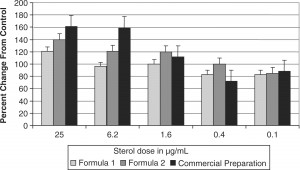Avocado Soy Unsaponifiables are the portions of avocado and soybean oils that cannot be turned into soap via hydrolysis. They consist mostly of sterols but have been reported to help arthritic joints in a couple of ways.
1. It stimulates the synthesis of glycosaminoglycans which is a component of cartilage and other connective tissue. ASUs actually stimulate cartilage repair.
Figure 1: Up-regulation of 35-sulfate incorporation in bovine chondrocytes exposed to ASU for 72 h. Data are plotted as the percent change from control ± SEM. All values are statistically different from control at P < 0.05.
Metabolic Effects of Avocado/Soy Unsaponifiables on Articular Chondrocytes
This study tracked the usage of a component, sulfate, of glycosaminoglycans after exposure to ASUs and found that ASUs increased the use of sulfate for glycosaminoglycan (cartilage) synthesis.
2. It decreases inflammation and prevents further damage to joints. It does this by inhibiting the production of interleukins-1,6,8, macrophage inflammatory protein 1-beta, nitric oxide, and prostaglandin. These are inflammatory markers that promote immune responses to the affected area. If you have rheumatoid arthritis, this process is detrimental as it promotes your immune system’s attack on your own joints.
As for actual studies and results, there are numerous studies on ASUs benefits for arthritis. Moreover, ASU is commonly used to treat osteoarthritis in Europe. It is prescribed as a 300mg dose of 1 part avocado unsaponifiables to 2 parts soybean unsaponifiables as Piasclédine.
One study published in Arthritis Research & Therapy found that:
Avocado/soybean unsaponifiables can reduce the development of early osteoarthritic cartilage and subchondral bone lesions in the anterior cruciate ligament dog model of osteoarthritis. This effect appears to be mediated through the inhibition of inducible nitric oxide synthase and MMP-13, which are key mediators of the structural changes that take place in osteoarthritis.
Another found that:
Administration of the drug within two years resulted in delayed destruction of the joints as shown in radiological evaluation. Application of piascledine is very well tolerated medication.
Yet another concludes:
A/S unsaponifiable mixtures had a more pronounced inhibitory effect on cytokine production than avocado or soybean residues added alone. As anticipated, IL-1beta induced a marked release of collagenase, stromelysin, IL-6, IL-8 and PGE2. A/S unsaponifiable mixtures partially reversed the IL-1 effects on chrondrocytes. These findings suggest a potential role for A/S unsaponifiable extracts in mitigating the deleterious effects of IL-1beta: on cartilage.
Finally, one review article which examined a number of studies states that:
Avocado/soybean unsaponifiables in a 300-mg daily dosage did reduce NSAID use and provide long-term symptomatic relief in two well-done clinical trials of three and six months. Patients with osteoarthritis of the hip appeared to attain a greater degree of benefit.
In conclusion, Avocado Soy Unsaponifiables should be included in any serious joint supplement as it is effective and is currently being prescribed in Europe for arthritis.


Is this supplement safe for breast cancer survivors with estrogen positive cancers?
I have found only two U.S. producers of ASU:
Maximize International Maximize ASU 300 with Sierra Sil, 60 Tablets, selling for $24.99 plus $5.99 shipping.
AND:
Dr. Theo’s Avosoy -ASU Alone, 30 Tablets, selling for $29.95 plus shipping (I assume $5.99 approx.)
Nice to have a second source but not at double the cost.
I would like a review and any evaluations on these two.
The “Maximize” product works for me.